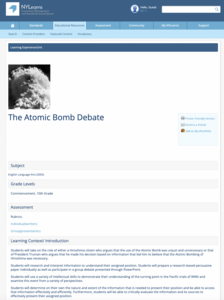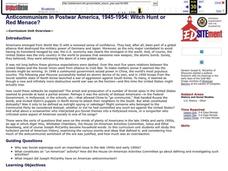National WWII Museum
Evaluating the US Decision to Drop the Atomic Bombs
While the use of the atomic bomb was the definitive end of World War II, the terrible weapons left new questions. Young scholars use primary sources and analytical worksheets to consider the implications of the fateful decision. Then,...
Curated OER
The Atomic Bomb Debate
Tenth graders play the role of a citizen from Hiroshima or President Truman. Using the internet, they research information to portray their part correctly. They present their position in a debate and examine the same events from various...
Carolina K-12
What Should President Truman Do?
After reading the article Choices: Truman, Hirohito, and the Atomic Bomb, class members engage in a simulation, assume the role of President Truman or one of his advisors and discuss the options open to the president. The exercise...
Carolina K-12
The End of World War II: Pearl Harbor, Japanese Internment Camps, and the Atomic Bomb
The end of World War II saw major events that would forever change the global landscape and international relations. Using a fantastic PowerPoint presentation and several primary source documents, your learners will discuss the bombing...
Curated OER
WWII and the Atomic Bomb
Students explore three decisions about the atomic bomb faced by the U.S. during WWII, take a position on each of the decisions, and defend their position. Should a bomb have been built, dropped, and was the right decision made?
Curated OER
Social Studies: Bombing of Hiroshima
Students read a first person account of the bombing of Hiroshima written by a Japanese physician. By reading Michihiko Hachiya's journal, they discover the fatalities caused by the bomb itself and later by radiation poisoning. To...
Curated OER
Hiroshima, From All Sides
Learners comprehend how the Atomic Bomb affected humanity and ended WWII. They comprehend how the Atomic Bomb affected: scientists, Japanese citizens, and US leaders. Students receive a copy of Hiroshima, Readers Theater Rubiv. They...
Curated OER
Victory in the Pacific
Students explore the overall Allied strategy in the Pacific from 1943-1945 and assess its effectiveness. They explore the reasons why the atomic bomb was used and why use of that weapon was controversial.
Curated OER
Atomic Bomb-Truman Press Release-August 6, 1945
Young scholars read a copy of Truman's press release regarding the atomic bomb. They answer a series of factual questions regarding the press release. They discuss the press release and then follow up with answering more in depth...
American Chemical Society
Protons, Neutrons, and Electrons
Atomic bombs harness the power in the nucleus of an atom, creating devastating power and damage. Classes review parts of an atom by charging a piece of plastic and holding it near their fingers, discussing what is happening and why....
Curated OER
My Antonia: Problematic Situations
Introduce your class to the characters from My Antonia by Willa Cather in a unique way. Given a hypothetical situation about an atomic bomb shelter and a list of character descriptions, pupils must decide which characters get to stay in...
Curated OER
Victory in the Pacific, 1943-1945
Students examine the military campaigns of the Pacific theater, tracing the path of the Allied offensives. The lesson plan presents what the Allies were trying to accomplish and why.
Penguin Books
An Educator's Guide to The Green Glass Sea by Ellen Klages
A lot of secrecy shrouded the creation of the atomic bomb. Readers uncover some of that secrecy using an educator's guide for the novel The Green Glass Sea. Three weeks of lesson plans feature discussion questions and reading...
A&E Television
The World Wars
Contemporaneously known as The Great War, World War I had never seen its match on the global stage—until World War II. An engaging set of resources designed to extend a viewing of the History Channel's The World Wars features discussion...
American Institute of Physics
African Americans and the Manhattan Project
A lesson about the Manhattan Project will explode young physicists' understanding of the racial attitudes in the United States during and after World war II. Groups select an African American scientist or technician that worked on the...
American Institute of Physics
African Americans and Life in a Secret City
Imagine the lure of being offered a job at a secret site, working on a secret project, and earning higher wages! Such was the approach used to recruit African Americans to Hanford, Washington, one of several sites used to develop...
American Institute of Physics
Women and the Manhattan Project
The Manhattan Project was a massive undertaking involving multiple sites and thousands of scientists and technicians. To gain an understanding of the women who participated in the project, groups select an oral history of a woman...
Shaker Junior High School Library Media Center
WWII Project Outline
Work together as a class and get to know the ins and outs of World War II with this engaging collaborative project. Class members are broken into groups to research particular war topics, from life on the home front to the Holocaust and...
BAE Systems
The Cold War
The Soviet Union's decision to block West Berlin from access by the Western allies began an international hostility that extended into the rest of the twentieth century. Class members examine both Harry Truman's and Joseph Stalin's...
DocsTeach
Letter to Truman about the Manhattan Project
Delve into the past to understand the opposition to the Manhattan Project. An interesting activity is designed to be completed in pairs, groups, or individually. Scholars analyze historical documents, complete an online worksheet, and...
Curated OER
Dancing in the Desert: The Genie
Fifth graders study nuclear destruction using visual literacy. In this nuclear destruction lesson, 5th graders work in groups to examine a group of pictures that show the destruction of a home by a nuclear blast. They discuss the type of...
Smithsonian Institution
Cuban Missile Crisis
The United States—specifically John F. Kennedy—played a large role during the Cuban Missile Crisis. A history resource poses questions that encourage critical thinking as well as in-depth analysis of images from the time period.
Curated OER
Witch Hunt or Red Menace? Anticommunism in Postwar America, 1945-1954
Students investigate what constitutes an "un-American" activity and why Soviet espionage was such an important issue in the 1940's and 1950's. Joseph McCarthy's impact on American anticommunism is examined in this lesson. There are three...
National Endowment for the Humanities
Soviet Espionage in America
The war against Communism and Joseph McCarthy’s place in it are the focus of a series of three lessons examining postwar America from 1945-1950. This first lesson asks groups to read an introduction that describes the Verona Project and...
Other popular searches
- Atomic Bomb and Japan
- Atomic Bomb Debate
- Atomic Bomb Pro Con
- Truman Atomic Bomb
- Dropping the Atomic Bomb
- Atomic Bomb and Hiroshima
- First Atomic Bomb
- Using the Atomic Bomb
- Atomic Bomb Hiroshima
- History, Atomic Bomb
- Harry Truman Atomic Bomb
- Atomic Bomb Pros Cons

























